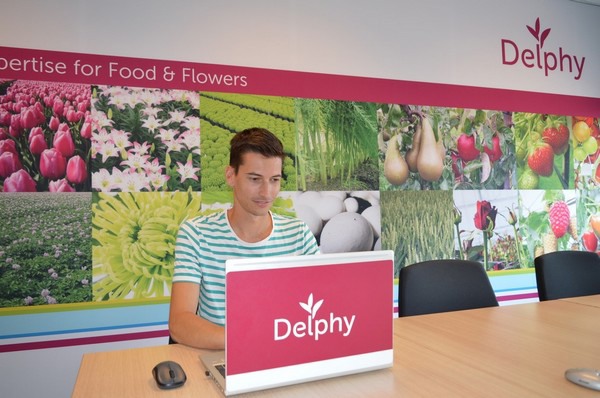Are we going to use lights or not? How many stems per m2 should we start with? These are all things tomato growers have to consider. Not only in the Netherlands but overseas too. Whatever decision you make, do not rely on your gut feeling.
"Support your cultivation choice with data. Make it measurable. And look at it from the plant's perspective," advises Max van den Hemel, Cultivation Engineer at Delphy Digital (pictured below). This Dutch company is working hard to make digitalization increasingly important in cultivation. QMS - Quality Management System - is a good example of this. These algorithms help growers work out different scenarios based on their cultivation strategies.

QMS tomato
QMS gives growers the tools to save energy and so arrive at an optimal starting scenario. It ensures that no unnecessary energy is consumed. You can enter the desired fruit weight, the number of fruits, climate strategy, location in the world, variety, and the number of stems into QMS tomato.
It then calculates a plan using your location's long-term average light per location. "Breeder input is vital because we can then capture the genetic information. That data is included in the algorithm. After all, every variety is different."
The model then determines how much light is needed, both for outdoor and artificial light, plant development and outgrowth duration, plant load, and expected production.
Once cultivation starts, you can use the Adaptive Strategy to update the cultivation strategy with realized data (climate and plant registration). "This lets you make timely adjustments to the cultivation strategy," explains Max.
 User experience
User experience
Dutch seed supplier Nunhems BASF uses QMS Tomato. "We've been working with it for more than a year now," says sales manager Erwin de Kok (pictured right), "and we're delighted with it."
According to him, that is because the system offers a new dimension to discussions with growers. "We can offer true value. The program helps us to properly communicate our strategic vision to growers. As a result, two growers have adjusted their cultivation plans."
"Experience naturally plays a role in our regular cultivation discussions. However, being able to substantiate our vision and make it visual with the help of QMS helps tremendously. Especially with unusual situations, like an irregular cultivation start date," explains Erwin.
An advantage of QMS is that it can be used variety-specifically. "Genes all react differently to different situations." Also, Erwin considered data-driven cultivation management to be a good development. "You base choices more on facts, not feelings; you start from actual data points. Of course, having a green thumb is still important. There's, thus, a trade-off. But data certainly makes for an interesting future," he continues.
Another advantage, especially for a company like Nunhems BASF with its many varieties and segments, is being able to look back in the database to see how things went. "That's fantastic. I consider it a cultivation strategy development tool too. Plus, new sales specialists can use it to advance quickly; the system teaches them how to do that," Erwin concludes. Colleagues from across the globe can thus benefit from QMS, thanks to the training Delphy provides.
For more information:
Max van den Hemel
Delphy 
Tel: +31 (0) 317 491 578
Email: info@delphy.nl
Website: www.delphy.nl
Erwin de Kok Nunhems BASF
Nunhems BASF
Mob: +31 (0) 614 427 646
Tel: +31 (0) 475 599 222
Email: erwin.dekok@vegetableseeds.basf.com
Website: www.nunhems.com
